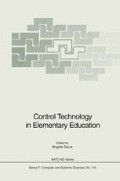Abstract
The purpose of this paper is to discuss and evaluate an open-ended LEGO-LOGO prototype project designed to facilitate learning about the structure and function of actual existing servo mechanisms. The theory of cognitive apprenticeship was applied in the modeling of the seventh grade students’ learning and their teacher’s role. The project was divided into five consequent stages: open investigation of actual existing phenomena, the representation of different forms of actual existing servo mechanisms’ structures and functions, the construction of LEGO® models, programming the models with LOGO and writing and presenting reports. The situation graph was used as a tool for knowledge representation and reflection in several phases of the project. In this paper both the methodology and the results of the work done by students will be discussed and evaluated.
Access this chapter
Tax calculation will be finalised at checkout
Purchases are for personal use only
Preview
Unable to display preview. Download preview PDF.
References
Achtenhagen F. (1990) Development of problem solving skills in natural settings. In Carratero M., Pope M., Simons R. and Pozo J.(Eds.) Learning and Instruction. European Research in an International Context: Vol III. Pergamon Press.
Anderson J.R. (1987) Skill acquisition: Compilation of weak-method problem solutions. Psychological Review, 94, 192–210.
Bereiter C. (1990) Aspects of an educational learning theory. Review of Educational Research. 60(4), 603–624.
Boy G. (1991) Intelligent assistant systems. Knowledge-based systems. Vol. 6. Cornwall: Academic Press.
Brown J.S., Collins A. and Duguid P. (1989) Situated cognition and the culture of learning. Educational Researcher, 18(1), 32–42.
Carrager T.N., Carrager D.W. and Schlieman A.D. (1985) Mathematics in the streets and the schools. British Journal of Developmental Psychology, 3, 21–29.
Collins A., Brown J.S. and Newman S.E. (1989) Cognitive apprenticeship: Teaching the craft of reading, writing and mathematics. In Resnick L. (Ed.) Knowing, learning and instruction. Essays in honor of Robert Glaser. Hillsdale, NJ: Lawrence Erlbaum Associates Inc.
De Corte E. (1990) Towards powerful learning environments for the acquisition of problem-solving skills. European Journal of Psychology of Education, 1, 5–19.
De Corte E. (1992) On the learning and teaching of problem-solving skills in mathematics and LOGO programming. Applied Psychology: An International Review, 41(4), 317–331.
Glaser R. (1987) Thoughts on expertise. In Schooler C., Schaic W. (Eds.) Cognitive Functioning and Social Structure over the Life Courses. Norwood: Ablex.
Harel I. (1991) Children designers. Norwood NJ: Ablex
Larkin J., McDermott J., Simon D. and Simon H. (1980) Expert and novice performance in solving physics problems. Science, 208, 1335–1342.
Paliscar A.S., Brown A.L. (1984) Reciprocal teaching of comprehension-fostering and comprehension-monitoring activities. Cognition and Instruction, 1, 117–175.
Papert S. (1991) Situated constructionism. In Harel I., Papert S. (Eds.) Constructionism. Norwood, NJ: Ablex.
Resnick L. (1987) Learning in school and out. Educational Researcher, 16(9), 13–20.
Resnick L., Klopfer L. (1989) Toward the thinking curriculum: An overview. In Resnick L., Klopfer L. (Eds.) Toward the Thinking Curriculum: Current Cognitive Research. 1989 ASCD Yearbook. ASCD.
Rogoff B., Lave J. (1984) Everyday cognition: Its development in social context. Cambridge, MA: Harvard University Press.
Scardamalia M., Bereiter C. (1985) Fostering the development of self regulation in children’s knowledge processing. In Chipman S., Segal J. and Glaser R. (Eds.) Thinking and Learning Skills. Vol 2. Research and Open Questions. Hillsdale, NJ: Lawrence Erlbaum Associates.
Shaw L.G., Woodward J.B. (1990) Modeling expert knowledge. Knowledge Acquisition, 2, 179–206.
Schoenfeld A.H. (1985) Mathematical problem solving. New York: Academic Press.
Schwartz S., Griffin T. (1986) Medical thinking: The psychology of medical judgement and decicion making. New York: Springer.
Shuell T.J. (1990) Teaching and learning as problem solving. Theory into Practice, 29, 102–108.
Vygotsky L.S. (1978) Mind in society. The development of higher psychological processes. Cambridge, MA: Harvard University Press.
Author information
Authors and Affiliations
Editor information
Editors and Affiliations
Rights and permissions
Copyright information
© 1993 Springer-Verlag Berlin Heidelberg
About this paper
Cite this paper
Enkenberg, J. (1993). Situation Graphs as Tools for Ordering of Students’ Thinking and Understanding of Actual Existing Servo Mechanisms. In: Denis, B. (eds) Control Technology in Elementary Education. NATO ASI Series, vol 116. Springer, Berlin, Heidelberg. https://doi.org/10.1007/978-3-642-58026-0_11
Download citation
DOI: https://doi.org/10.1007/978-3-642-58026-0_11
Publisher Name: Springer, Berlin, Heidelberg
Print ISBN: 978-3-642-63441-3
Online ISBN: 978-3-642-58026-0
eBook Packages: Springer Book Archive

